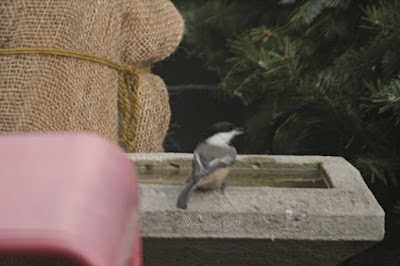 |
| "THE CHIKADEE" BY RALPH WALDO EMERSON |
As promised in my last entry (published on 1-7-2021), I'm back in the blogging saddle for now. My absence wasn't so long when I consider it has been over eight years (November 18th 2012) since I heard the sound which poet, Ralph Waldo Emerson, calls the "gay and polite" "cheerful cry" of a Chickadee occcuring in my rooftop garden but I heard it this morning.It truly took me by surprise to notice one of this bird type at a bird bath that is located in the northern portion of my place.
I was totally unprepared (especially camera wise) for such a sighting on this cold day in the third week of January so my picture of this visitor is not remarkeable as evidenced below...
 |
| CHIKADEES ARE REFERENCED IN WIOB* |
Seconds later, I realized the creature had a partner who availed him/herself of a snack from one of my bird feeders (as seen in the next picture)...
 |
| CHICKADEES ARE REFERENCED IN WIOB* |
... but again I was totally unprepared (camera wise) for such a visit.
A few beats later they flew off quickly to settle within branches of Ailanthus Trees in my courtyard...
 |
| CHICKADEES ARE REFERENCED IN WIOB* |
 |
| CHICKADEES ARE REFERENCED IN WIOB* |
I certainly got much pleasure in the visit from these litle ones and I hope they don't wait another eight years to return.
*WIOB is the abbreviation for the title of my book series, Words In Our Beak which reference Chickadees.


No comments:
Post a Comment
Note: Only a member of this blog may post a comment.